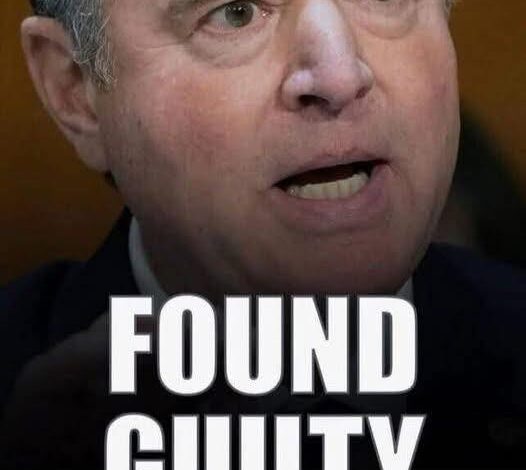
The release of FBI interview summaries has reignited long-standing debates surrounding the Trump–Russia investigation, with explosive claims that Rep. Adam Schiff (D-CA), the former chair of the House Intelligence Committee, may have approved or directed selective leaks of classified material. While no formal charges have been filed, the documents and accompanying whistleblower testimony have stirred a political firestorm, particularly among critics of Schiff who have long accused him of exploiting intelligence access for partisan gain.
The Whistleblower’s Allegations
At the center of the controversy is a whistleblower described as a former Democratic intelligence officer. This individual claims that Schiff actively encouraged his staff to leak information considered damaging to Donald Trump during the height of the “Russiagate” narrative. According to the account, Schiff’s alleged goal was not the protection of national security, but rather the advancement of political objectives—including raising his own profile for a possible appointment as CIA Director had Hillary Clinton won the 2016 election.
The whistleblower further asserted that Schiff’s office developed a strategy of highlighting “derogatory” intelligence, shaping it into narratives that could be released to sympathetic journalists. The testimony also pointed to Rep. Eric Swalwell (D-CA) as a potential secondary channel for funneling material to the press. Swalwell has vigorously denied this, calling the claims “baseless, politically motivated, and designed to distract from real issues.”
The Media Connection
One of the more striking allegations involves the media’s role in amplifying the supposed leaks. The whistleblower claimed that some disclosures made their way to Washington Post reporter Ellen Nakashima, whose reporting was central in shaping early public perceptions of Trump’s alleged ties to Russia. The contention here is not that the leaks exposed wrongdoing or threats to national security, but rather that they were weaponized to advance a partisan storyline—one designed to weaken Trump’s presidency from its earliest days.
Critics argue that if true, this represents a dangerous blurring of the line between legitimate congressional oversight and outright political maneuvering. Schiff has long positioned himself as a defender of transparency and accountability in intelligence matters. These new claims, if substantiated, would undercut that image by suggesting he used his privileged position on the Intelligence Committee to pursue political vendettas.
Denials from Schiff and Allies
Both Schiff and Swalwell have denied any misconduct. Schiff has not commented directly on the latest FBI interview summaries but has consistently rejected accusations that he mishandled classified information during the Trump–Russia investigations. In past statements, he has accused his critics—largely from the Republican side—of engaging in smear campaigns designed to silence his oversight of the Trump administration.
Swalwell was more direct, dismissing the whistleblower’s allegations outright. “These are recycled lies meant to score points in an election cycle,” he said in a recent statement. “There is no evidence—because nothing of the sort ever happened.”
Questions of Credibility
While the FBI documents have raised eyebrows, it is important to note that they do not contain formal charges or conclusive findings of wrongdoing. Instead, they provide a record of testimony from individuals who may have had their own motivations. The whistleblower in question has admitted to being dismissed from their position after reporting the alleged leaks, a detail that raises questions both about possible retaliation and about their credibility. Was the dismissal an attempt to silence them, or did it stem from unrelated issues? That remains unclear.
Critics of the whistleblower note that no direct evidence—such as email trails or recorded instructions from Schiff—has been made public to date. Supporters counter that the very nature of intelligence oversight makes hard proof difficult to surface, as much of the process happens behind closed doors and with limited documentation.
Political Fallout
Regardless of whether the claims are ever substantiated, their political impact is significant. Schiff has been one of the Democratic Party’s most visible figures in intelligence and national security debates, particularly during the Trump years. He led the House’s impeachment efforts, frequently sparred with Republican colleagues, and built a national profile as one of Trump’s sharpest critics.
For Republicans, these allegations provide fresh ammunition to argue that the Trump–Russia narrative was tainted from the start by partisan manipulation. Some conservative commentators have already seized on the FBI summaries as proof that Schiff acted less as an impartial watchdog and more as a political operator.
For Democrats, the timing is awkward. With the 2024 election cycle still echoing in political memory and 2026 already on the horizon, renewed attacks on Schiff and Swalwell could shape voter perceptions—particularly in districts where trust in political institutions is already low.
Why It Matters
Even without definitive proof, the controversy highlights the fragile boundary between congressional oversight and partisan warfare. The Intelligence Committee is tasked with some of the most sensitive responsibilities in government—handling classified material, overseeing intelligence agencies, and safeguarding national security. If its members are perceived as using that access for political gain, the committee’s legitimacy suffers.
As of now, the allegations remain unverified. They could prove to be overblown claims from a disgruntled former staffer—or they could open the door to further investigation into how intelligence was handled during one of the most divisive chapters in recent political history.
Either way, the fallout is a reminder of how deeply the Trump–Russia saga continues to shape American politics. Nearly a decade later, it remains a battlefield where questions of power, truth, and accountability collide—and where figures like Adam Schiff find themselves once again at the center of controversy.